And in nothing terrified by your adversaries: which is to them an evident token of perdition,
but to you of salvation, and that of God.—Phil. 1.28
|
Psalms, Hymns, and Spiritual Songs: Identifying the Hymns of New Testament Christianity. By Jeremy Kerr |
|
Hymns — Baptist Hymns, Lutheran Hymns, Methodist Hymns, Revival Hymns, Traditional Hymns... possibly you have your favorite type, your favorite hymnal, or your favorite hymns. But ultimately songs of praise and worship ought to be for the one who is worshipped, and not for the one worshipping. Does God have a preferred kind of hymn? |
Brief Overview: 9 Minutes, 57 Sec. Full Text and Intro: 25 Minutes |
In the religious world of our day, it is clear that many people would put their own preferences before the Lord’s pleasure. But that is not what the early Christians did, and not what the apostles teach in their letters to the early churches. We may conclude therefore, that the hymns and songs preferred by the apostles, are a good direction to us in determining how we should praise the Lord in worship song. James gives direction to “sing psalms” (James 5.13,) and Paul twice in his epistles refers to “Psalms, and Hymns, and Spiritual Songs.” (Eph. 5.19, and Col. 3.16.) In these passages, Paul clearly intends that such songs should be sung among God’s people. So what were they? Observing the mere terms, many imagine that these three expressions — Psalms, Hymns, Spiritual Songs — amount to a broad warrant for all the types of worship song with which they are familiar.
But if Paul intended these words to be understood and applied in a more specific manner, should we take them in whatever way is convenient for explaining practices that Paul himself would not follow? Do we risk departing from the purity and simplicity of New Testament Christian worship, by misunderstanding the proper application of these terms?
Those who have read the history of God’s works in the world during the times of early persecution in the Roman Empire, down through the Reformation era, and then also through the struggles of the persecuted Huguenots in France and Covenanters in Scotland, cannot help noticing that the Psalms of the Bible, that is, the Book of Psalms with its 150 songs in the middle of our Bibles, formerly prevailed as the most abundantly used, and most powerfully enjoyed source of worship song. For many, there was never a thought of using any other songs, and they certainly didn’t think it would be needful. Were they neglecting “hymns” and “spiritual songs” while they used the Psalms, or is there something about Paul’s three words that actually gives the believer triple-direction to worship God with the songs in the Book of Psalms?
Below, I intend to step the reader through an important comparison between Paul’s expression “psalms and hymns and spiritual songs” and the terminology which was used in the Old Testament of Paul’s time, as it was translated into Greek, and familiar to many of Paul’s readers. Because most English readers will find obscure the words and very letters of the Greek text of Paul, and the Greek Old Testament (known as the Septuagint or LXX,) several pictures are included with highlighting of the specific terms of interest.
Figure 1: Ephesians 5:19
To begin, we want to notice the three terms that Paul uses: ψαλμοις or Psalms, υμνοις or Hymns, and ωδαις or Songs. These three words are all plural forms (plural dative to be specific,) and in the singular forms would be simply ψαλμος, υμνος, and ωδη. Hover your mouse over the image below, and you should see highlighted each of these three words as they are used by Paul.
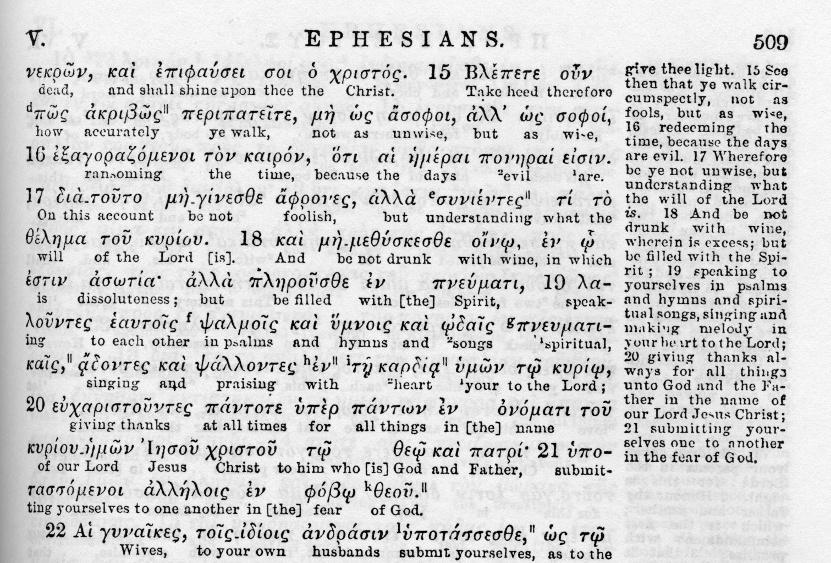
When it comes to pronunciation, there are various approaches to pronouncing ancient Greek. A close-to-modern-Greek pronunciation would be: psal-MEES, EEM-nees, and oh-DACE. The only term that doesn’t at least partially match our English term is the last, ωδαις (oh-DACE) from the singular ωδη, (oh-DEE). But it does closely match another word we have in English: Ode. A mechanical approach to translating Paul might have yielded, “psalms and hymns and odes spiritual.”
Now, the question we are considering is whether the Old Testament Book of Psalms, as known to many people in the day of Paul, includes such psalms, hymns, and spiritual odes? and if so, does it include such an abundance of psalms, hymns, and spiritual odes, that the reader of Paul’s letters would ordinarily conclude that by using these terms he was simply directing them to the Bible’s Book of Psalms itself? The figures or samples which follow, will serve to help the reader answer that question. They are all taken from a copy of the Greek Septuagint, as it was translated by Sir Lancelot Brenton and published in the 1800s.
Figure 2: Psalms 4 and 5
In the figure below, the reader will find the Greek word for Psalm used in the titles of Psalm 4 and Psalm 5. In the case of Psalm 4, it has the same spelling as when it is used by Paul. In the case of Psalm 5, it has the same spelling as was indicated above for the regular singular form. It should be noted that in Greek, words can have different endings not only to distinguish between singular and plural, but also to distinguish between subjects, direct objects, and other grammatical uses. But in this case, the form of the word for Psalm is precisely as mentioned above. Hover your mouse over the image to see the words clearly highlighted, and their translations underlined.

Above, it should also be noticed for Psalm 4 that the title actually includes two of our terms-of-interest: ψαλμοις and ωδη. Together with the preposition εν, (or 'en',) the expression amounts to saying “a song in Psalms” or, as it is translated, “a song among the Psalms.” So, already, we are finding that two of Paul’s terms were used in the Book of Psalms, as translated in the Septuagint or LXX. Next, we will look at Psalms 29 and 30.
Figure 3: Psalms 29 and 30
In the Septuagint, Psalms 29 and 30 are numbered differently, but the text is easily identified with the Psalms in our Bible. Their titles also demonstrate the use of the word regularly translated as Psalm, and, in the case of Psalm 30, a combination of terms that includes both ψαλμος and another form of ωδη. Hover your mouse over the image to have the words highlighted.
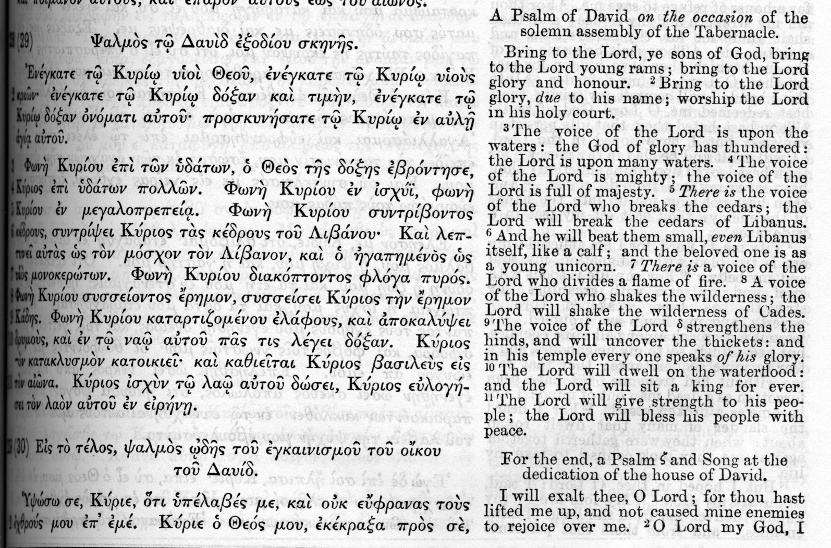
In the above example from Psalm 30, the expression ψαλμος ωδης could be more literally translated as “a psalm of a song,” and emphasizes the reality that something which is a psalm may also be a song, and vice versa. In other words, there never was any reason for a reader of Paul to think that he would have to go outside the book of Psalms in order to find Songs. But that is pretty intuitive after all. At this point we have found the words for Psalms and for Songs, but what about the word for Hymns? The next example shows us Psalms 54 and 55.
Figure 4: Psalms 54 and 55
In Psalms 54 and 55 we have the word for hymns found in their titles, just as it was used by Paul: υμνοις. In both cases it is part of the Greek expression for “Among the Hymns of Instruction” and stands where our English Bibles translate the original Hebrew as “Maschil”. Hover your mouse over the image to see highlighted the word for Hymns, and expression “among the hymns of instruction.”
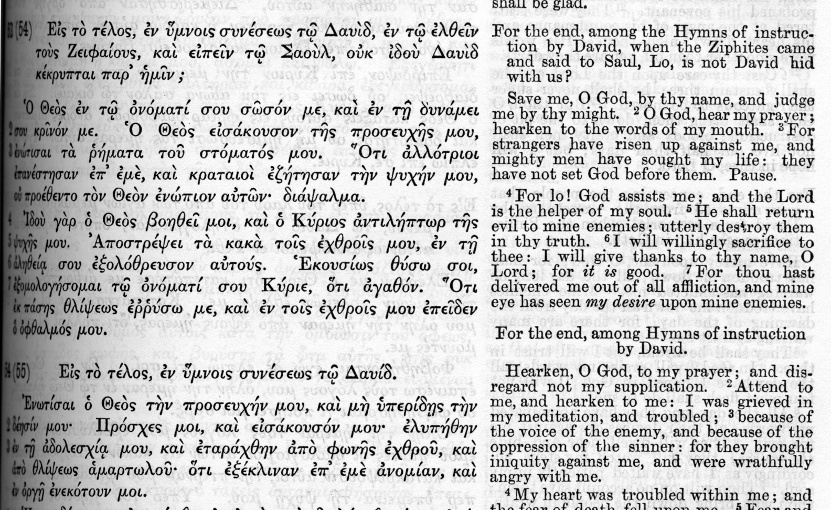
At this point, we have now found the Greek terms for Psalms, Hymns, and Songs in the old Greek Septuagint. We could stop here, but for a better sense of how directly the terms of Paul would have led the minds of his original readers to the Book of Psalms in our Bible, to the titles used there, and to all of the famous songs of David as the “sweet psalmist of Israel,” (2 Sam. 23.1,) the following examples will also be valuable. We’ll continue with Psalms 67 and 68.
Figure 5: Psalms 67 and 68
Between the two of these together, Psalms 67 and 68, the reader will find all three words that are used by Paul. The first of these is “among the hymns, a psalm,” and therefore uses the plural υμνοις just like Paul, and the singular ψαλμος. The second example is “a psalm of a song,” which is the expression we saw used with Psalm 30 in its title.

Perhaps the whole discussion could have been summarized with those two examples, but there is actually one Psalm that includes all three terms in its title. We’ll consider that next.
Figure 5-b: Psalm 76
Psalm 76 uses the term υμνοις for Hymns, in the same form as Paul’s letters, and the terms ψαλμος for Psalm, and ωδη for Song, both in the singular. They are used in the expression “among the hymns, a psalm for Asaph, a song.”
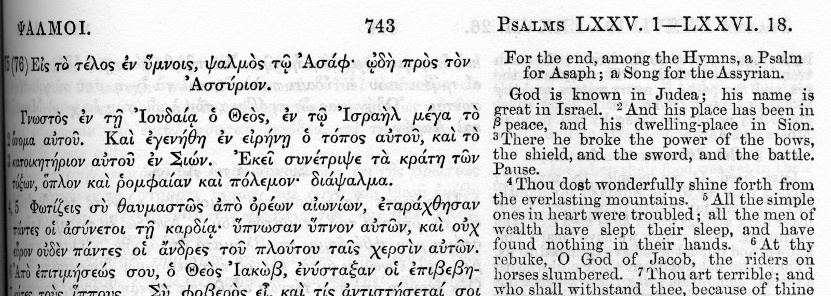
In other words, a given song out of the Bible’s Book of Psalms, can be a “Psalm” and a “Hymn” and a spiritual “Song” at the same time. At this point, we see it is rather artificial to think that the terms used by Paul would ever oblige Christians of any time period to compile collections of hymns or spiritual songs distinct from the Book of Psalms. In fact, the Christian Church has had its compilation of “Psalms and Hymns and Spiritual Songs” as long as it has had the Bible’s Book of Psalms. — Almost done. But let’s consider this example too:
Figure 6: Psalms 126 and 127
If you’ve read the Book of Psalms much, and paid attention to the titles, you’ve noticed the “Songs of Degrees.” All of these have the term ωδη in the titles in the Greek expression for Song of Degrees. Because it’s the first word in the title, it is written with a capital omega, so we see Ωδη instead of ωδη, but it is the same word.
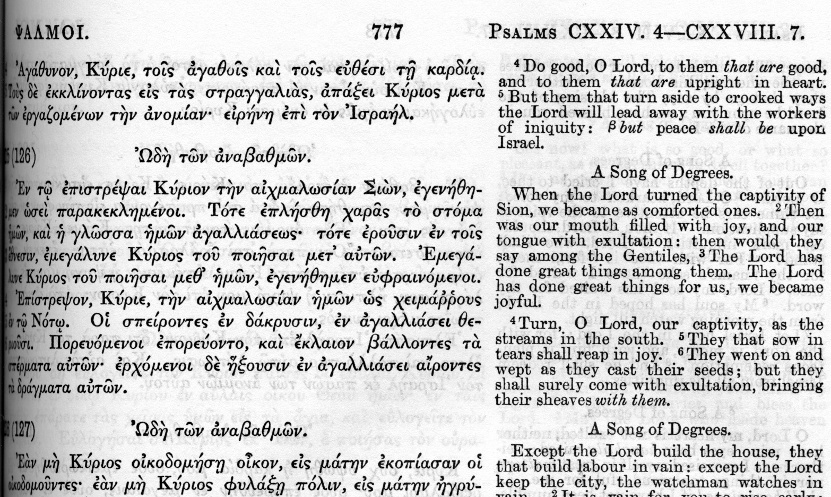
The above samples do not present every use of the terms Psalm, Hymn, or Song, in the old Greek Book of Psalms, but it should be enough to show how easily and how readily the reader of Paul would have recognized his twice-used phrase “psalms and hymns and spiritual songs” as being nothing less than a triple-reference to the Book of Psalms. Even if an avid modern-hymn-lover finds it too disappointing to embrace this realization at first, urging it is possible that Paul knew other Hymns and Songs, and had them in mind, he will at least have to acknowledge that because all three of these terms in Ephesians 5.19 and Colossians 3.16 could be referring to the songs in the Book of Psalms, neither of these verses can be seen as mandating the use of any worship song other than those which are in the Book of Psalms. This fact, combined with the Bible’s clear message that we should only worship God in the ways he has commanded, is why many of the most devoted and evangelical Christians of the past, like the early Christians, the Huguenots, and the Covenanters, only sang the Psalms, and abstained from incorporating man-made Hymns of any sort into their worship practice.
One nagging consideration might still hang in the minds of those who are not familiar with the Greek language: None of the examples above use the exact term ωδαις (oh-DACE) that Paul used in his letters. They use the word for Song or Ode in the singular, but not in the plural, and not in the specific plural that ends with αις. If you noticed this, we have an important verse to consider from outside of the Book of Psalms.
Figure 7: The History in 2 Chronicles 23.18.
In 2 Chronicles 23 we have the remarkable history of the Reformation led by Jehoiada (or Jodae in the Greek) which included the slaying of the evil queen Athaliah (or Gotholia in the Greek,) the setting of Joash on the throne, and the destroying of the worship of Baal. At the bottom of this sample, you’ll see one other step that was part of that Reformation: restoring the sacrifices and songs that ought to have been used in the worship of God. It is here that we find the use of the term ωδαις (oh-DACE) and have it emphatically associated with the songs “by the hand of David” which every Christian knows to be the Psalms.
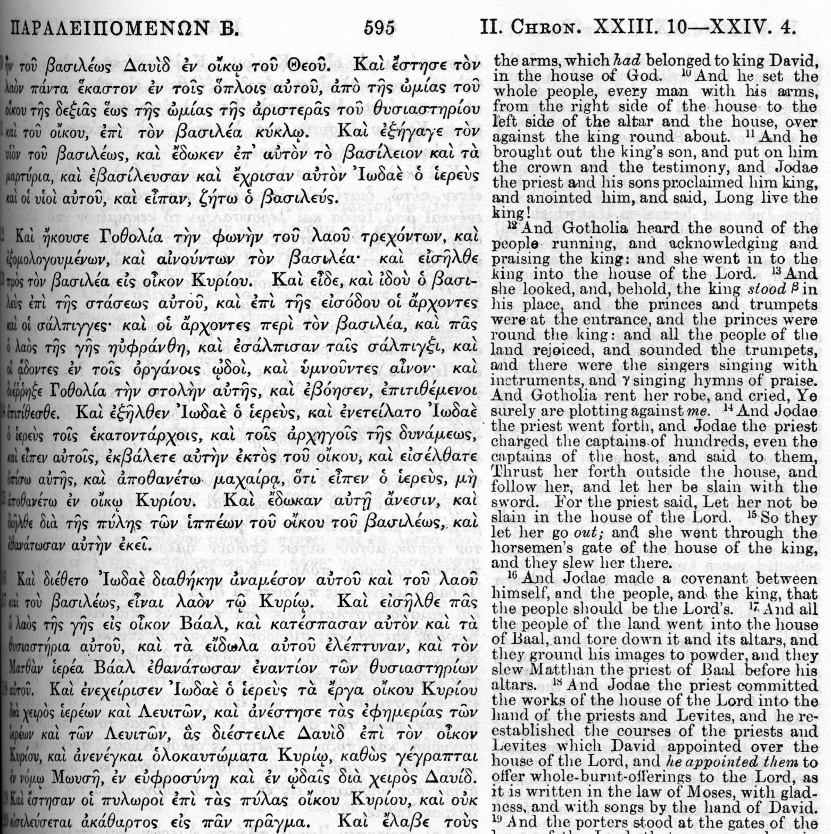
At this point we have seen that the Greek Septuagint, or LXX, and the Bibles of Paul’s time use all three words ψαλμοις for Psalms, υμνοις for Hymns, and ωδαις for Songs, to refer to the contents of the Psalms of David and Book of Psalms from the Old Testament.
If you love the New Testament, you should love singing the Psalms of the Bible, because these express and facilitate the spirituality and devotion of all the writers of the New Testament. Those writers, whether Paul or James or Matthew, didn’t have Baptist hymns or Lutheran hymns. But we may say that they had Revival Hymns, Traditional Hymns, Spiritual Odes of the Works of God, Spiritual Hymns of Thanksgiving, and Spiritual Songs of Repentance, if we consider the breadth of content which we find in the Book of Psalms. If you want Revival, Tradition, Songs about the history of God’s works, Songs about the Saviour Jesus, (such as Psalm 22 and Psalm 110,) or any other Spiritual Songs, that is what you have in the Book of Psalms. God himself gave them. Does he want you to look elsewhere? No — Not at all.
A final observation should also be offered with this reference to the Reformation led by Jehoiada: It was a National Reformation, and a Covenanted Reformation. We live in very bad times, when the morals of society are destroyed, children are slain to satisfy the desires and accommodate the fears of evil people (like Athaliah had done for herself,) and the worship of most churches is utterly corrupted. Men forget that God calls for the worship that he has commanded, and in turning to the things they expect to please people, they turn their backs on God. These are the circumstances which call for Reformation, but by Reformation we cannot limit our thoughts or goals to the mere revival excitements of scattered congregations. Reformation in the time of Jehoiada, and Reformation in the 1500s and 1600s of Protestant History, was much more powerful than local excitement. To be sure, local excitement and the revival of a congregation is precious and essential to the progress of lasting Reformation, but society-transforming Reformation calls for more. Sometimes evil rulers must be slain, and wars must be fought. Often Covenants are sworn, and new terms of political alliance are defined with the glory of God given its proper regard as superior to all other concerns. Often the worship of false gods must be eliminated, and force used to effect the work. And always the worship used in the house of the Lord must be brought back into conformity to his word. The land and the temple must be purged. (2 Chron. 34.8.)
Some Searching Questions
Do you want Reformation? Or do you just wish the bad guys would be respectful and keep the status quo? Possibly you think you would like Reformation, but are not in earnest about this. The fact that this is the case with most Christians may be a large part of the reason that we not only have no Reformation, but instead have a church and society that is plummeting into new depths of depravity with great rapidity. Consider: Would you support a Jehoiada in his opposition to an Athaliah, and obey his direction, or encourage those you love to do so? If the leaders of the Christian Church were endeavoring to unify the Church and obtain commitments to sound doctrine from civil rulers and the community in general, would you also be willing to swear a National Covenant? If false religions were being outlawed in your nation, would you be earnest to persuade idolaters to repent and believe on the Lord Jesus, or would you align yourself with their resistance in the name of an illicit freedom? If less-Biblical traditions and customs of the church were being displaced by a more-Biblical uniformity of worship practice, would your love for old traditions and the present looseness of practice give way to a proper zeal for the purging of God’s house and re-introduction of Bible-directed worship practices?
Needless to say, there are answers here which most of us need to be more ready to give with an earnestness that is hard to find in our hearts. It is easier to admire the martyrs and covenanters of the past than to follow their footsteps. A host of obstacles hinder us in all these things. But I’ll forbear offering the list of things which are most likely contributing to this. Let me be concise at this point and offer you a remedy which will help with all of those obstacles, and which no Christian can refuse:
Sing the Psalms. Sing all of the Psalms. Sing them in your church, and sing them in your home. If your church will not sing the psalms, find another church. If singing the psalms changes your spiritual life, then that is good. If singing the psalms changes your outlook on the world, that will be right. If singing the psalms changes your practical life, that will be for the best. By all means, sing these “psalms and hymns and spiritual songs,” of David, Asaph, Moses, and others, so much loved by Paul. Do you admire Moses, or Paul? Lutheran hymns will not make you more like Moses, and Baptist hymns will not make you more like Paul. The believing and spiritual singing of the Psalms will make you more like Moses, more like Paul, and more like Jesus. This is sure. Sing the Psalms.

